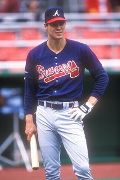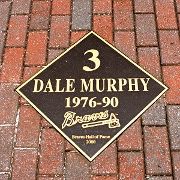|
There was a time, as recently as five years ago, when Dale Murphy grudgingly accepted his meager Hall of Fame support without protest or complaint. The voters had overwhelmingly decided that Murphy, while a terrific player at his peak, faded too quickly to merit a place in the baseball shrine. And Murphy, true to character, smiled and conceded that the electorate might be justified in its skepticism. But 15 years in Cooperstown's waiting room have a way of changing a man's perspective. Murphy, who is making his final appearance on the ballot this year, has gradually warmed to the "Big Hall" school of thinking. With all due respect -- and an acknowledgement that it's a bit "self-serving" to promote his own cause -- he thinks there's room for a plaque with Dale Murphy's name in the museum on Main Street.  "Do I belong in there with a Hank Aaron? No, I don't think so," Murphy says. "But I believe there's a spot for me, and I wouldn't have said so 10 years ago. "If you're going to take the smaller Hall of Fame approach, it gets pretty exclusive. For the overall good of the game, and the marketing of the game and where it's headed, I think it's OK to expand this thing. I would love to see guys like Alan Trammell, Jack Morris, Lou Whitaker and Gil Hodges in the Hall of Fame. I don't think it hurts the standards of the Hall of Fame. I think it enhances it." The chance of Murphy improving from 14.5 percent to the requisite 75 percent plurality six days from now are roughly equivalent to the Houston Astros winning the American League West in 2013. But long odds can't stop the people most profoundly affected by Murphy from stating his case until the last vote is tabulated. And no, we're not talking about former teammates, Atlanta Braves fans or Bob Knepper, who got dinged for a 1.358 OPS and eight home runs in his career by The Murph. Over the past month, baseball writers with a Hall ballot and an open mind have had a little something extra to ponder thanks to a smorgasbord of Tweets, blog posts and other testimonials from Dale and Nancy Murphy's eight children, who range in age from 19 to 32 and talk about their dad in a way that seems downright old-fashioned. If the Waltons had access to wireless technology on the foot of that mountain during the Great Depression, this is how they might communicate their love for their father with the world. Madison, the only Murphy daughter and the youngest of the group, kick-started the initiative with a blog post beneath the title "My Dad is a Super Hero." Taylor, 25, followed with an online petition that's been signed by Larry King, Justin Verlander, Dick Vitale and more than 6,000 other supporters. Tyson, a character artist at Blizzard Entertainment and the acknowledged non-athlete in the family, paid tribute to his father by creating a cartoon. And Chad, the oldest child and a doctoral candidate at Penn State, wrote an "open letter" to the 500-plus voters in the Baseball Writers' Association of America extolling the virtues of his father. In recent weeks, the other Murphy boys (Travis, Shawn, Jake and McKay) did their part for the movement with interviews, moral support and word-of-mouth endorsements. As an exercise in holiday bonding, it's more labor-intensive than baking sugar cookies and more gratifying than bundling up in parkas and heading out to the local Cineplex to see "Les Miserables." "I think all the kids started feeling, 'What can I contribute? What can I give?"' Nancy says. "They all took the thing they're really good at and tried to do something to benefit their dad. The only thing they said to Dale at the beginning was, 'Is it OK if we do this for you? We don't want to embarrass you or anything.' Things just sort of snowballed from there. "Dale is self-deprecating in a lot of ways. It's hard for him to let people say nice things about him. For our kids to verbalize in their own way how much they love him and the impact he's had on their lives, that's been great. It's been a really sweet experience." At the peak of Murphy's career, it appeared his achievements would speak for themselves. In 1983, he joined Ernie Banks, Joe Morgan and Mike Schmidt as the fourth National League player to win back-to-back MVP awards. He ranked second to Schmidt with 308 home runs in the 1980s, and was tied for second in RBIs (with 929) behind Eddie Murray when the RBI was held in greater esteem. When Murphy was introduced as a "future Hall of Famer" before a game in Colorado in 1993, the public-address announcer appeared to be stating the obvious. But knee problems and declining bat speed ultimately forced Murphy to retire with 398 home runs, 2,111 hits and a .265 batting average, fringe numbers at best. A popular feature on the website Baseball-reference.com reflects his decline: At age 28, Murphy's closest statistical comparable was Reggie Jackson. Check out Murphy's career profile today, and his closest parallels are Andruw Jones and Joe Carter. Somewhere between his prime years and his farewell tour, he slipped from "sure thing" to "wait till next year." Murphy received 19.3 percent of the vote in his first appearance on the ballot in 1999 and a high of 23.2 percent the following year before slipping below 10 percent in two elections. This year he will become the 35th player to linger on the ballot for 15 years without a congratulatory phone call. Richie Ashburn, Jim Bunning, Orlando Cepeda, Nellie Fox, Bill Mazeroski, Ron Santo and Red Schoendienst all made it to Cooperstown eventually through the Veterans Committee. Dick Allen, Ken Boyer, Steve Garvey, Hodges, Tommy John, Jim Kaat, Tony Oliva and Luis Tiant are among the former stars with pockets of support who have never attracted a wide enough following to make it through the Hall's doors. If Murphy's candidacy has done anything, it's fueled debate about the importance of Rule 5, which advises voters to consider a candidate's "record, playing ability, integrity, sportsmanship, character, and contributions to the team(s) on which the player played." Murphy received some negative fallout during his career for objecting to the presence of female reporters in the clubhouse because it conflicted with his Mormon beliefs, but he nevertheless embodied the ideals that parents impart to Little Leaguers across America. Joe Torre gave the most telling personal scouting report on Murphy after managing him for three years in Atlanta: "If you're a coach, you want him as a player," Torre said. "If you're a father, you want him as a son. If you're a woman, you want him as a husband. If you're a kid, you want him as a father." For more than three decades, any personal profile of Murphy is required to use the adjective "nice" at least once. Kansas City outfielder Jeff Francoeur, who sets the standard for fan outreach among modern-day players, still remembers going to Atlanta-Fulton County Stadium at age 5 and getting Murphy's autograph. The encounter helped shape his worldview on professional athletes and the way they should treat fans.  After Madison wrote her piece for the "Hall of Very Good" blog, she discovered that her father's sense of obligation didn't end with standing at the rail and signing every baseball, jersey or game program thrust in his face. One reader recalled how he got an autograph and was walking away when he heard Murphy say "Excuse me, you forgot your pen." Those thoughtful little gestures help explain why No. 3 jerseys are still so popular in Atlanta. "People always ask, 'Is your dad really that humble?"' Madison says. "Yeah, he really is. There's no baseball Dale Murphy and father Dale Murphy. It's all the same person. He's just a warm, humble, kind, compassionate person. That's what we've always loved about both of our parents." Regardless of what transpires when the 2013 vote is announced next week, Murphy's world will keep spinning. He will be part of Torre's Team USA coaching staff in the World Baseball Classic and is scheduled to do some broadcast work for the Braves again this season. He is active in The Church of Jesus Christ of Latter-day Saints, gives motivational talks and continues to speak out against steroids through his I Won't Cheat foundation. Murphy is a staunch opponent of PED users in Cooperstown, although he concedes that baseball writers have a difficult call judging players who never flunked a test and are under scrutiny only because of hearsay or circumstantial evidence. "If guys admitted or tested positive, I don't think they should go in," Murphy says. "Everyone understood that it was against the law. You had to have a false prescription to get that stuff because it was a controlled substance. It was also against the spirit of the game. That's why everybody did it in secret. I have a hard time endorsing that, because there were a lot of guys who decided 'I'm not going to do that."' If the Hall voters cut Murphy some slack in his final year on the ballot because he was a "clean" player, he can live with that. And if the publicity gives him a boost that helps his cause with the Veterans Committee down the road, that would be a nice fringe benefit, too. For now, the mutual benefits of the campaign can't be measured by Murphy's vote count. He's just a proud father, and Madison Murphy and her seven brothers are enjoying the opportunity to share a group hug with their dad on a national stage. "It's been rewarding for all of us just getting feedback from people and hearing all the stories about my dad," Madison says. "We're hoping for the best, obviously. But whatever happens, it doesn't change the way we feel about him. We all think he deserves it. That will never change regardless of what the Hall of Fame says."
|
